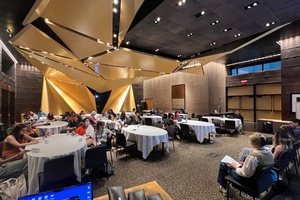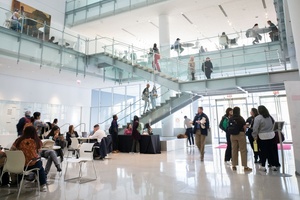Features:
SRCCON Spotlight: Sometimes I Sit and Think About Evergreen Content…
…and Sometimes I Just Sit. It’s a session about archives, pulled (wait for it) from the archives.

This year’s SRCCON—our fourth—begins today. To kick off the run-up to the event, we’ve been featuring a selection of sessions from last year’s conference, including transcripts and audio when we have them, and brand-new interviews with the session facilitators.
The Session
A rich backlog of content can be an asset or a burden or both. This session was led by facilitators who have successfully wrangled their archives and lived to tell the tale.
Notes & Docs
From the session description: Archive stories can hold a rich and unique mirror to the events of today, but face a number of challenges in being found and resurfaced: organization, classification, relevancy. Resurfacing content from even moderately sized archives is a challenge: often, it’s as much art as science. It is almost a brute force exercise to determine quality and notability. Yet we know there is a meaningful history and legacy buried there. How do we make sense of the present when we cannot easily access the past? Why is this hard?
Our Q&A with Michael Donohoe and Matt Dennewitz
We caught up with Michael and Matt to talk about how their session unfolded, what kind of preparation they did to make it work, and what they learned from the experience.
Q. What was your session about, and how did you land on that topic?
Michael: We are continuously publishing new stories, content, data, images, and more. While we’re grappling with the day to day, we’re also taking this and pushing it across new mediums all the time. At almost every step of they way, you encounter the craziest and most bizarre edges cases. Sometimes this emerges from omissions in editorial workflows, or the CMS that was badly implemented, or the platform that has inflexible demands on what you must provide. Our session was part therapy, part “let’s look at this as a meaningful problem” so we can talk solutions and make change.
Matt: Something we’ve both seen a lot of is the peculiarities that arise from even the best and most sane of editorial workflows, and how things can get weird when you introduce new platforms and distribution outlets unconcerned with your own practices. No one’s alone here, and everyone’s hoping they solved it as well as they’re projecting others have.
Q. What was the session’s structure like?
Michael: We did not want to dictate a format, we wanted to touch upon a number of recurring themes within this area. While Matt and I walked through a conversation, we wanted to get the audience talking to us and each other.
Matt: While I think we ended up doing most of the talking, the audience helped us keep a conversation going rather than letting it slip into monologue.
Q. What did you cover in the session?
Michael: Our original doc that we collaborated on is here.
Matt: We used two fonts in our collab doc? Yikes.
Q. Do you remember any specific highlights or surprises from your session or its aftermath?
Michael: I was surprised to learn how much data has been lost in some organizations. We talk about CMS’s, and we think often in text, but there is so much more—and it’s either lost entirely, or improperly recorded; so very very tough to reconcile.
Matt: I was particularly happy that we got onto the topic of dealing with archives.
Q. Looking back, has the way you think about your topic changed since SRCCON?
Michael: No. In many respects the problem is confirmed…Even now it continues to be an issue as publications have to convert their content into a multiple formats across numerous platforms.
Credits
-
Matt Dennewitz
-
 Michael Donohoe
Michael Donohoe
I’ve been in engineering and product field within media for far too long. I was lucky to work on fun projects at The New York Times and luckier to help build Quartz, and later rebuild The New Yorker. I get criticized a lot for having no Irish accent.



